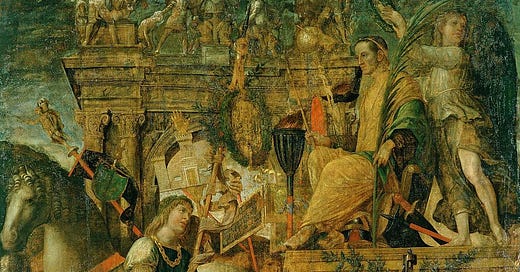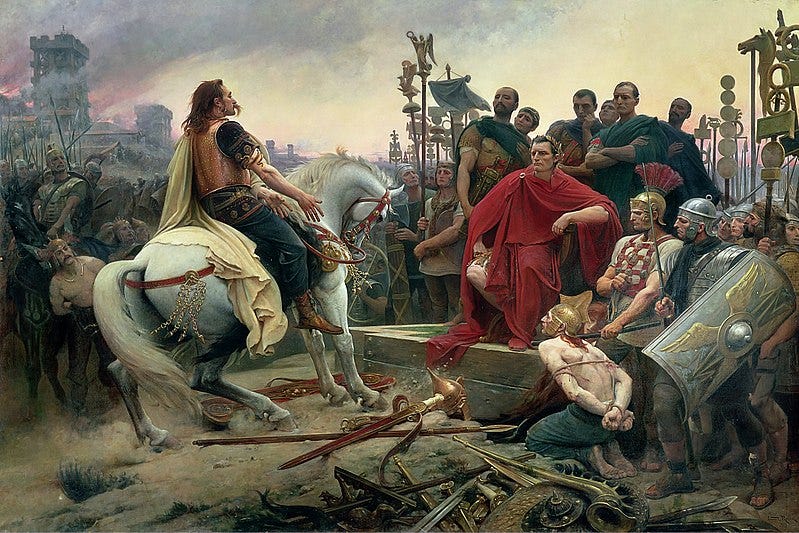Caesar utters his famous phrase veni, vidi, vici after defeating King Pharnaces in Asia Minor. The asyndeton of the line reflects the speed of his victory over the king. Not only a declaration of his military prowess, but a boast in defiance of his rival Pompey, against whom he has declared war. Almost a decade earlier, Pompey led a campaign against King Pharnaces’ father, Mithridates. The ruler of Pontus had been a thorn in the side of Rome since the time of Marius and Sulla, who themselves fought a civil war over the right to defeat him. Neither had managed to do so, and it took Pompey four years to finally accomplish the feat. But Caesar has defeated his son in just five days.
More astonishing is the fact that the episode is but an interlude to Caesar’s ongoing civil war. He has already defeated Pompey at Pharsalus decisively, and received his head on a silver platter in Egypt. He has already fought a war in Alexandria to secure Cleopatra’s seat on the Ptolemaic throne.
After his victory against Pharnaces, he will fly to North Africa and to Spain to crush the remaining supporters of Pompey. He will learn of the suicide of his long-time rival in the Senate, Cato, who took his own life rather than be captured in Utica. He will have swept away his foes and leveled the institutions of Rome so that he alone stands tallest above it.
The alacrity with which he accomplishes this is no less a consequence of the momentum of his wars in Gaul when, for eight years, he campaigned ruthlessly against the tribes of France, Belgium, Switzerland, and Britain, winning renown abroad and among the plebs at home.
All in all, it takes just under fifteen years for Caesar to amass his legend and conquer the world.
But as Cicero poignantly observes in a letter to a friend, “We are his slaves, but he is a slave to the times.” Indeed, if the conditions in Rome were not already ripe for sowing a new order out of the rotten and decaying state, Caesar could not have planted his flag in the soil. The death of the Republic comes about in much the same way that Mike Campbell, in Hemingway’s The Sun Also Rises, goes bankrupt: Gradually, then suddenly.
Veni, Vidi, Vici We are his slaves, but he is a slave to the times. —Cicero I came to the footbridge over the Rhone. I saw the Helveti, their numbers expelled from the woods, bearing their burdens and their home. I burned the bridge and conquered them. I came to the western banks of the Rhine. I saw Ariovistus, his arrogance, unwilling to entreat, and flanked him between the pine. I conquered the elvin pride of the Suebi. I came at dawn to the soldiers’ barracks and saw mutiny and men doubting war. I conquered their fears and indolence, and we made many, many more. The Atuatuci, the Nervii, the Veneti, all the old tribes of windswept Armorica I subdued until I reached the sea, and for a fortnight I was honored in Rome. I saw the dark and dripping wilds of Britain and crossed to its shore and stood before the woad-smeared faces of druidic demons stalking the woods, and conquered them. I came upon the barbaric wolds and saw the tribes uniting their scattered oppida and gave them instead the Roman Law, and I conquered them one and all. Idutiomarus, and shameless Ambiorix, the vergobrets like beacons lighting hilltops I snuffed them all, even Vercingetorix who laid at my dais his armor and his sword. And I came to the river Rubicon when I saw Pompey would not put up his arms, and looked back at Gaul, and the fear was gone. I conquered what doubt could do me harm. I came to the Senate demanding funds and saw their faces cowed with shame, abashed, yet not for what they’d done, and seized their gold for my campaign. To Spain and Asia and Greece I came, the harbors and the battlefields I saw. I conquered with bloodshed and the flame, and held the world, and myself, in awe. I heard the voices of a greatness past and felt their words and deeds in me reborn. I came to Egypt and held my enemy’s head, and saw that vision of Isis in human form. We came to the upper reaches of the Nile and saw the lands the first peoples trod, the sunburnt idols honored with temples, and thought I, too, am become a god. All the ends of the earth where I came I folded into me, in a decade, and saw how after me they would not be the same. I conquered the world with but a name.






Such sweep, such majesty, and élan in conquering the far corners of the world with swiftness hitherto unforeseen.
Robert, your poem kept me up at 3.18 h CEST, it woke me up to the Slumber of Our Times: it kindled a sense of urgency, with the cobwebs of regret, malaise and inertia swept away...
"Gradually, then suddenly"...
It's infused with, and exudes, power, potency, and grace in its cobertura/coverage of an epoch and event so massive, so thunderous in its impact on world history and the milieu of that age.
I look forward to more poems from you... a diamond 💎 in The Dark.